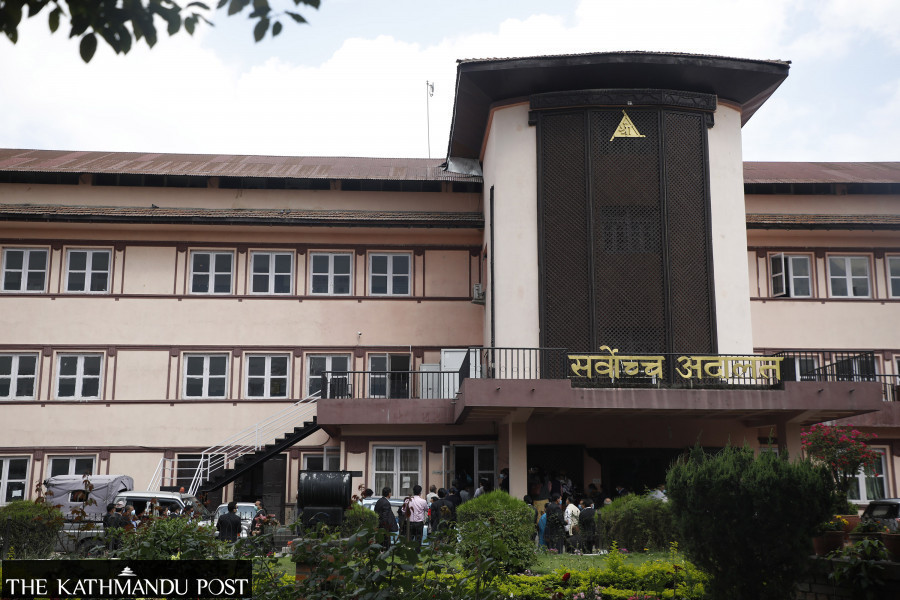National
Court gives executive four months to set up juvenile courts
In their absence, rehabilitation of children is affected as regular courts often fail to properly handle the cases.
Binod Ghimire
With successive governments reluctant to implement its earlier orders, the Supreme Court has given the executive until mid-July to establish juvenile courts.
Issuing a full text of the September 24 verdict on Friday, a division bench of the court has asked the Prime Minister’s Office, the ministries concerned and government bodies to constitute the courts within the current fiscal year. Reiterating earlier court orders and quoting existing legal provisions, the court said, “Now it is not the government’s prerogative to decide whether or not to constitute the courts."
The division bench of justices Anil Kumar Sinha and Til Prasad Shrestha has also directed the Judgement Enforcement Directorate to monitor whether the ruling has been implemented. As per the verdict, the government, in consultation with the Judicial Council, can set criteria to establish the courts.
In the strongly worded ruling, the court said the delay in establishing even a single juvenile court is not due to a lack of resources. “This reflects a lack of commitment on the part of the government on the one hand and a lack of accountability in the officials holding authority. It will not be an overstatement to conclude this is a portrayal of the absence of good governance,” reads the court order.
Dedicated courts with judges who understand the sensitivity of children are necessary, as per court ruling, as cases relating to them should be treated with special care.
Advocate Ajay Shankar Jha had moved the Supreme Court demanding an order against the government, asking it to establish juvenile courts in districts with 100 or more cases related to children for three consecutive fiscal years. The top court, however, leaves it up to the government and the council to determine the criteria.
Jha said judges dealing with regular cases are deputed to juvenile benches, and they view children's wrongdoings through the lens of the criminal justice system. "Several verdicts by such benches have not followed the norms of juvenile justice," he told the Post. “It’s already too late to establish juvenile courts."
The Children’s Act of 1992 first envisioned a juvenile court to hear cases relating to children. As no initiative was taken for years to implement the legal provision, advocate Santosh Kumar Mahato moved the Supreme Court in 2004 seeking its intervention. The verdict on the petition issued on November 24, 2005, asked the government to establish such courts, but it was never followed.
Tarak Dhital, former executive director at the National Child Rights Council, says dedicated courts are necessary to ensure the entire system, from the staff to the judges, understands the sensitivity of children. Children don't commit crimes deliberately; different circumstances compel them to take such steps, he said.
"The judges passing verdicts must ensure their decisions are aimed at correcting children and helping them integrate into society," Dhital told the Post. “Only dedicated judges in dedicated benches understand these issues."
The Act Relating to Children-2018, which replaced the 1992 law, also envisions the establishment of juvenile courts. Clause 30 of the Act says the Nepal government may, on the recommendation of the Judicial Council, form the required number of juvenile courts to originally proceed, and try and settle the offence committed by children. It envisioned constituting juvenile benches in the district courts until separate courts are established. Several district courts have juvenile benches to deal with children’s legal cases.
Jha last year knocked on the top court’s door as the juvenile courts were not established years after its order and the promulgation of the laws.
Child rights activists have been arguing that in the absence of dedicated courts, clearance of cases on the offence committed by children is taking time. The prevailing Children Act says juvenile court/bench shall generally dispose of a case within 120 days from the date of filing of the case, and the proceeding and adjudication of such a case shall be made on the basis of continuous hearing.
As the district courts are overwhelmed with cases, they have failed to clear them in the stipulated time in several instances. The delay in deciding the cases means accused children serving time in a juvenile correction centre have to spend longer periods there, which is an injustice on those who are acquitted. In several instances, children have to wait years for the final verdict.
In March last year, the top court issued a ruling requiring the prompt resolution of juvenile cases within 120 days in accordance with the law. A full bench of Justices Prakashman Singh Raut, Sapana Pradhan Malla, and Shrestha had directed the district courts to expedite the resolution of juvenile cases.
As per Jha’s complaint, some district courts have over 500 juvenile cases, and it is impossible to clear them within the stipulated time without dedicated courts in place.




 10.12°C Kathmandu
10.12°C Kathmandu















